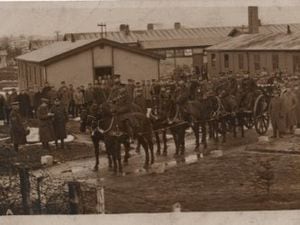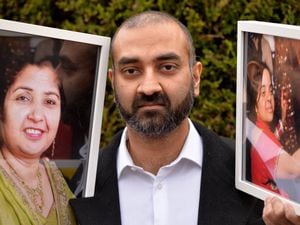Inside ICU: The NHS heroes fighting coronavirus as second wave hits West Midlands
Hospitals across the West Midlands are being forced to adapt to cope with the escalating coronavirus crisis. We speak to staff on the front line.
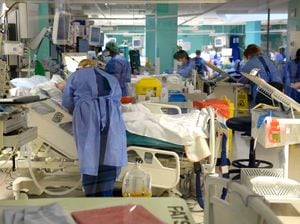
Rows of critically ill patients fight for breath, cared for by medics in the heat of battle.
This is the reality of coronavirus – and those working in our intensive care units want people to understand the enormous pressure they are under.
Hospitals across the region say they are braced for the most critical period of the pandemic – with intensive care patient numbers about to hit peak levels.
They expect demand to soar over the next two to three weeks, on the back of a record number of coronavirus cases in the past fortnight.
New Cross Hospital in Wolverhampton allowed the Express & Star in to see its intensive care unit at full stretch.
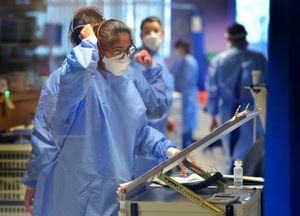
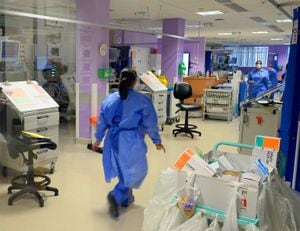
It has drafted in staff from other areas of care to help with the battle, which is made more complex by the need to keep Covid cases on separate wards from other patients.
Dr Brian McKaig, deputy medical director for the Royal Wolverhampton NHS Trust, said it was “a daily struggle” to make sure the hospital has adequate staff and enough capacity.
He said New Cross now had 320 beds taken up by critically ill Covid patients, and that rising demand had meant less space for those suffering with other medical emergencies. With urgent heart operations and cancer treatments already having been pushed back, he said a crucial period lay ahead.
“We know that the numbers of cases in the last two weeks have been at their highest levels nationally, at between 55,000 and 65,000,” Dr McKaig said.
“When we see those numbers of cases, that translates as people coming into hospital 10-14 days after that, so we know the levels of demand we are going to be seeing.
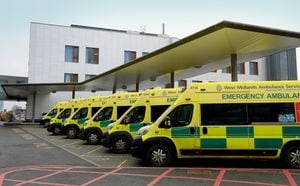
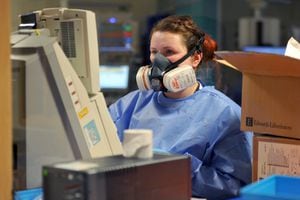
"This pressure will be there for at least the next two to three weeks, and patients are often in hospital for 10-14 days because they are so unwell, which puts huge pressure on beds.”
After weeks of rising cases the region has seen infection rates fall slightly over the past few days, something Dr McKaig says will help hospitals cope.
He said: “Two things are really going to help us: when cases start to come down in the community, and the vaccination coming along.
“That’s when the pressure will start to ease and we can start to consider starting our key services again. It must be so difficult for people who need an operation but don’t know when it will be. We want to get back to doing that as soon as we possibly can.”
Dr David Stanley, a consultant intensivist on the critical care ward at Russells Hall Hospital in Dudley, said: “At the moment, this is an absolutely crucial time. We know how hard it is, but please, stay at home and follow the rules.”
Fighting to maintain life
To the hardworking doctors, nurses and health workers at the region’s hospitals, the Covid pandemic feels like a never-ending saga.
Working on the coronavirus front line over the past 10 months their sacrifices have been great, with long hours, huge workloads, and isolation from their own families all part of the daily routine aimed squarely at protecting lives.
Each 12-hour shift is a battle to keep people alive, with the vast majority of patients’ requiring round-the-clock support.
And with cases rising sharply since Christmas, NHS staff are bracing themselves for their busiest period of the entire pandemic.
The continued rise in demand has led many hospitals to redeploy staff from other departments onto packed Covid wards.
Dental health specialist Caroline Bestwick has been on the intensive care unit at New Cross Hospital since November, working 12-hour shifts helping out with some of the poorliest coronavirus patients.
She admits it is a world away from her day job at Pennfields Medical Centre, where she works with hard to reach groups in the community who struggle to access dental treatment.
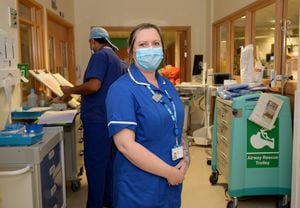
She said the unit is getting busier by the day and she is on her feet most of the time, helping to clean patients and assisting medical staff at bedside on wards crammed with ventilator and other medical equipment.
Most of the patients she deals with are critically ill. Many of them don’t make it through, and for the first time in her career she has had to face up to dealing with body bags.
“These patients are fighting for their lives,” she says.
“We’re just running on adrenaline at the moment and I don’t think it has all sunk in. It is something I have never experienced. I think I’ll probably struggle to adjust back when it is over.”
More Covid-19 coverage:
Mrs Bestwick said the festive period was a particularly difficult time.
“You could really feel it,” she said. “It was really upsetting having to tell family members to come to the hospital because a loved one was not going to make it.
“It is horrific.”
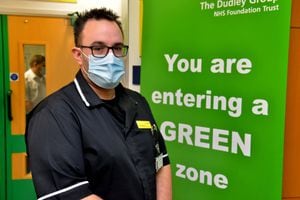
The scale of the challenges faced by staff is a major concern for health chiefs, with many hospitals expecting to hit peak demand over the coming weeks.
Jack Richards, chief nurse covering surgery, women and children at Russells Hall Hospital in Dudley, said the pandemic was having a noticeable impact on those around him.
“I can see staff are tired and I am worried about them,” he said. “They are working very, very, long hours.
“I don’t think people are getting to see their families much because they want to the best for the patients.
“That means they are frequently working six to seven days a week, and will continue to do so.
“But nobody has said they want to stop. They are all very committed to what they do. It is admirable.”
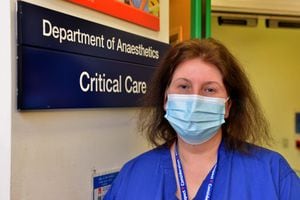
Lesley Smith, deputy matron for the critical care ward at Russells Hall, said there was a fear that staff could burnout, with many of them having been working “flat out” since the start of the flu season in October 2019 – months before the Covid outbreak.
She was struck down with Covid at the start of the pandemic last March, as was her colleague, sister Harpreet Kaur.
Ms Kaur, who has worked at The Dudley Group NHS Foundation Trust for three years, said: “It was just a horrible experience. It was really scary, between life and death.
“Looking back, I didn’t know whether I would survive at that time.”
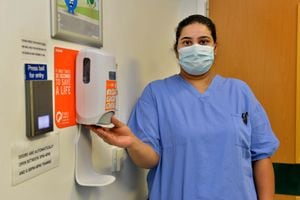
Meanwhile Dr McKaig said he had never known a situation like it in 30 years in the NHS, with increasing intensive care capacity for coronavirus patients having a “huge knock on effect” on other areas of care.
“We have significant concerns that if the current rate of admissions continues, we will be challenged in terms of finding spaces for everyone in the hospital,” he said.
Other services have already had to be reduced, he said, including heart and cancer operations.
“When someone comes to your emergency department who can’t breathe and is close to dying, you have to treat them, there is no other option,” he added.
“That has to then be balanced against someone who has a cancer, which if you don’t operate on in a period of time could have a significant impact on their quality of life, but whose immediate need for treatment is slightly less than that person who comes through the door who is going to die in front of you.
“When the overwhelming pressure is that person who needs treating there and then, it becomes the priority.
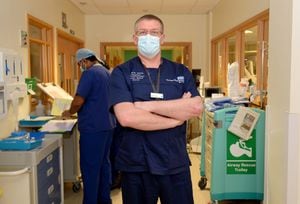
“If the numbers increase to a certain point, then those other services have to be stepped down. We’ve been making those decisions all the way through the pandemic.
“So people who require urgent heart operations, cancer treatments… we are having to reschedule and put them back.”
Reflecting on the impact the pandemic is having on hospitals, Dr McKaig said it was “exceptionally disappointing” that some people still believed that Covid was a hoax.
“It is a dangerous view,” he added.
“We see day in, day out just how real coronavirus is. We have patients in their 20s, 30s and 40s in our intensive care unit.
“We have had nearly 500 deaths in Wolverhampton as a result of coronavirus. We see the relentless pressure that is put on our hospital and staff, on patients and families
“If anyone is in any doubt about whether this is real, they only need to look at the facts and the figures and see the staggering number of deaths in this country.
“Coronavirus does kill people.”
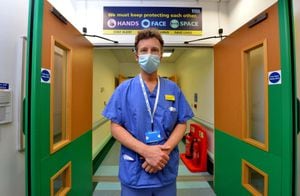
Dr McKaig has urged people to respect lockdown rules in order to save lives, and his view is echoed by Dr Stanley on the critical care ward at Russells Hall.
“We, as the medical staff and nursing staff, know how difficult the situation is for everyone,” Dr Stanley said.
“We are all parents, children, we have our worries about our own families.
“We understand, we are the public as well, we are all in this together.
“We know how hard the situation is. We just ask people to just please be careful and follow the rules.”
Nearby in Shropshire, Dr Elin Roddy, an ICU consultant at Telford’s Princess Royal Hospital, said she had made a conscious choice to ignore the Covid deniers.
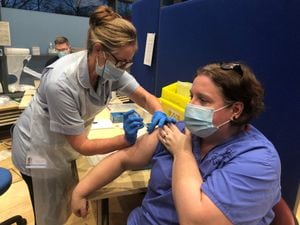
She said: “I do not understand their motive. It used to make me angry but I think that is a wasted emotion so my feeling now is these people do not deserve my energy. My energy is limited and needs to be focussed on looking after patients and my family so I try and ignore it.
“That does become different though when it is people encouraging other people to behave badly – to not have the vaccination or to break lockdown.”
She also urged people to be in no doubt that Covid “is so much more than flu”.
She said: “I can see why people would like to think it is the flu – that they can get back to normal but the reality is it is much worse, far more deadly and we need to hold the line until we can get out of this.
“We have a ward on each site full of people on breathing equipment.
“Those wards did not exist at this time last year. Those people will not feel better in a few days.About a quarter will die and that is a big number.”

